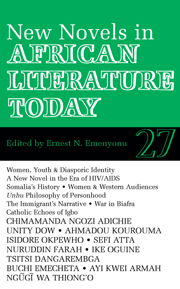EDITORIAL ARTICLE: The African Novel in the 21st Century: Sustaining the Gains of the 20th Century
Published online by Cambridge University Press: 05 April 2013
Summary
In 1986 Wole Soyinka made history by becoming the first African and the first black person to win the coveted Nobel Prize for Literature. By the turn of the new millennium, three other African writers, all novelists, had won the Nobel Prize for Literature. This conferred on the African novel, and African writing in general, a legitimacy, relevance and authenticity which centuries of denigration and distortion had sought to deny.
With the publication of Chinua Achebe's Things Fall Apart in 1958, the literary world woke up to a new invention – African dynamics in the art of the novel. The modern African novel which emerged in the middle of the twentieth century brought with it new motifs, new symbolisms and new techniques in the fictional representation of human reality which were to force redefinitions and expansions of E.M. Forster's ‘aspects of the novel’. The African novel emerged to ‘fight’ the battles of and for African communities in various locations on the continent. The African novelist emerged as a true voice of Africa and Africans, and, as the conscience and sensitivity of the society, boldly challenged untenable myths and stereotypes of Africa and Africans in the wider world. The African novelist debunked the age-old concept of ‘art for art's sake’, taking on the issues of the human condition in Africa and aligning him or herself with the cause of the people. ‘Art for art's sake’ was repudiated in the new definition of the function of art as an inevitable, socially relevant and vital force.
- Type
- Chapter
- Information
- New Novels in African Literature Today , pp. x - xiiPublisher: Boydell & BrewerPrint publication year: 2009

